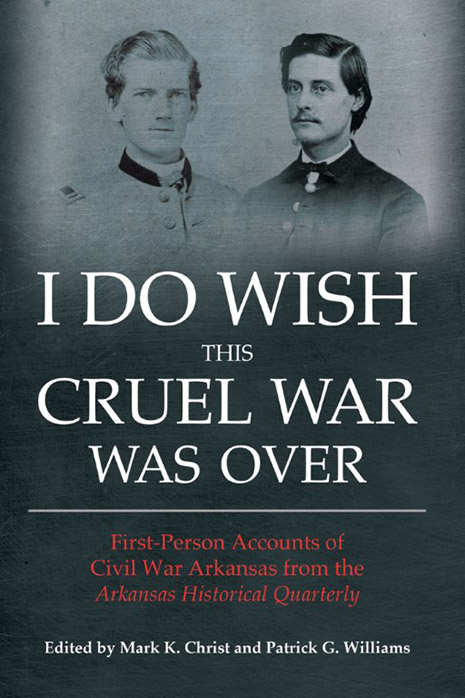FAYETTEVILLE, Ark. – In the early months of 1864, Lt. Robert Gilliam of the Arkansas Battalion of State Troops, a company that was fighting for the Confederate States of America, exchanged letters with his wife, Frances.
Gilliam’s unit was so close to his farm and store in Sevier County that he could make home visits. In a letter dated March 9, 1864, Frances Gilliam wrote to her husband, “Be sure to come home Saturday.”
She continued, “Oh, I do wish this cruel war was over and you were at home to stay. I believe I would be as happy as anybody.” Frances Gilliam’s wish never came true. A few weeks later, her husband died at the battle of Marks’ Mill.
Gilliam’s unmet wish provides the title of the book I Do Wish This Cruel War Was Over: First-Person Accounts of Civil War Arkansas from the Arkansas Historical Quarterly (paper, $34.95). The book is part of the ongoing The Civil War in the West series published by the University of Arkansas Press.
Edited by Mark K. Christ and Patrick G. Williams, I Do Wish This Cruel War Was Over offer a first-hand, ground-level view of the war’s horrors, its mundane hardships, its pitched battles and languid stretches, even its moments of frivolity. The book collects diaries, letters and memoirs excerpted from their original publication in the Arkansas Historical Quarterly, which has been published since 1942 by the Arkansas Historical Association.
For example, the letters between the Gilliams originally appeared in the article, “From Paraclifta to Marks’ Mill: The Civil War Correspondence of Lieutenant Robert C. Gilliam,” published in the fall 1958 edition of the Quarterly.
The book’s readers will find varying degrees of commitment and different motivations among soldiers on both sides, along with the perspective of civilians. In many cases, these documents address aspects of the war that would become objects of scholarly and popular fascination only years after their initial appearance: the guerrilla conflict that became the “real war” west of the Mississippi; the “hard war” waged against civilians long before William Tecumseh Sherman set foot in Georgia; the work of women in maintaining households in the absence of men; and the complexities of emancipation, which saw African Americans winning freedom and sometimes losing it all over again.
Altogether, these first-person accounts provide immediacy and a visceral understanding of what it meant to experience the Civil War in Arkansas.
In their introduction, The Civil War in the West series editors, Daniel Sutherland, a Distinguished Professor of history at the University of Arkansas, and T. Michael Parrish note, “Nothing brings the Civil War to life as much as a letter or diary written by a participant in the struggle. Students of the war are doubly blessed in this sense, first, because the Civil War generation wrote so often about their wartime experiences, and, second, because later generations treasured and preserved these invaluable documents. The trick, always, has been to make their writings available to the public.”
Christ is community outreach director at the Arkansas Historic Preservation Program and the editor or author of many books on the Civil War, including, most recently, Civil War Arkansas, 1863: The Battle for a State.
“As we commemorate the 150th anniversary of the American Civil War, it is important to remember that it was fought here, in our own backyards,” Christ said. “The personal accounts contained in this book allow us to better understand the actions and motivations of the people who experienced the war, and when they are coupled with a visit to the places where those actions happened, it gives us a real connection today with those long-ago events.”
Williams is associate professor of history at the University of Arkansas and editor of the Arkansas Historical Quarterly. He is the author of Beyond Redemption: Texas Democrats after Reconstruction.
Williams, citing Christ’s central role in historical preservation in the state and his enormous contributions to the Arkansas Civil War Sesquicentennial Commission, said the book illustrates the importance of partnership among institutions in promoting Arkansas studies.
“The University of Arkansas and J. William Fulbright College of Arts and Sciences can be proud, too, of their role in making this testimony available to the public,” Williams said. “Except for a few years in the 1950s, the Arkansas Historical Quarterly has always been edited by a member of the history faculty. Supporting the Quarterly is another way the college and the university serve the people of Arkansas and advance scholarship more generally.”
The release of I Do Wish This Cruel War Was Over coincided with the 73rd annual conference of the Arkansas Historical Association, which was held April 3-5 at Historic Washington State Park in Washington, Ark. This year’s conference theme was “The Home Front.” Sessions highlighted the Arkansas Civil War home front as well as Reconstruction, World War II and the Cold War.
The University of Arkansas Press was founded in 1980 as the book publishing division of the University of Arkansas. A member of the Association of American University Presses, it has as its central and continuing mission the publication of books that serve both the broader academic community and Arkansas and the region.
Contacts
Melissa King, director of sales and marketing
University of Arkansas Press
479-575-7715,
Chris Branam, research communications writer/editor
University Relations
479-575-4737,
